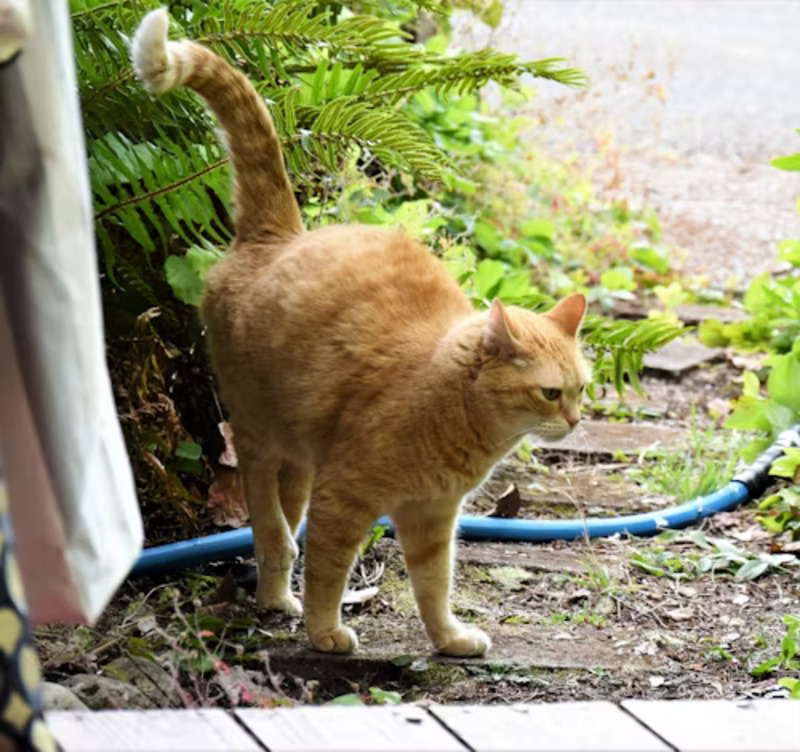How to Stop a Cat From Spraying
Published on June 26, 2025

Discovering that your cat is spraying urine around your home can be a deeply frustrating and stressful experience. That pungent, unmistakable odor is hard to ignore and even harder to eliminate. However, it's crucial to understand that this behavior is not an act of spite or a sign of a "bad" cat. Spraying is a complex communication behavior with deep-seated instincts. Addressing it effectively requires patience, detective work, and a compassionate approach.
This comprehensive guide will walk you through the essential steps to identify the root cause of spraying, how to manage it, and how to restore harmony to your home.
Spraying vs. Urinating: What's the Difference?
First, it's important to distinguish between spraying and improper urination. Regular urination involves squatting and depositing a larger volume of urine on a horizontal surface, like the floor or a rug. This is often related to a litter box issue or a medical problem.
Spraying, on the other hand, is a marking behavior. A cat will typically back up to a vertical surface (like a wall, a piece of furniture, or a curtain), lift its tail, which may quiver, and spray a small amount of urine. This urine contains pheromones that act as a chemical message to other cats.
The Core Reasons a Cat Sprays
Understanding the "why" is the key to solving the problem. The primary triggers for spraying fall into a few key categories:
- Unneutered Status: Intact male and female cats have a strong hormonal drive to mark their territory and signal their availability to mates. This is one of the most common and preventable causes.
- Territorial Insecurity: Cats are highly territorial. The presence of new cats in the home, stray cats visible through a window, or even the lingering scent of another animal on a visitor's clothes can make a cat feel their territory is threatened, prompting them to re-assert their claim by spraying.
- Stress and Anxiety: Cats thrive on routine and can be easily stressed by changes in their environment. This can include moving to a new house, rearranging furniture, a new baby, a change in your work schedule, or loud noises. Spraying becomes a self-soothing mechanism in these situations.
- Underlying Medical Conditions: It is critical to rule out health problems. Conditions like a urinary tract infection (UTI), kidney stones, or bladder inflammation can cause pain and an urgent need to urinate, which can sometimes be mistaken for spraying.
The Step-by-Step Plan to Stop Spraying
1. The Vet Is Your First Stop: Before you invest time and money in cleaning supplies and behavioral products, schedule a visit with your veterinarian. A thorough check-up and urinalysis can rule out any painful medical issues that could be causing the behavior. If a medical problem is found, treating it may resolve the spraying entirely.
2. Neuter or Spay Your Cat: If your cat is not already neutered or spayed, this is the single most effective step you can take. It dramatically reduces the hormonal drive to spray in the vast majority of cats. The sooner this is done, the better, as it can prevent the behavior from becoming a learned habit.
3. The Power of Enzymatic Cleaners: Cats are drawn to re-spray areas that carry their scent. Standard household cleaners or ammonia-based products will not eliminate the uric acid in cat urine. You MUST use a high-quality enzymatic cleaner, which contains special enzymes that break down and completely neutralize the odor-causing molecules. Clean all soiled areas thoroughly according to the product's directions.
4. Create a Fortress of Security: Reduce your cat's stress by enriching their environment. This means providing plenty of resources to prevent competition and anxiety. Ensure you have one litter box per cat, plus one extra. Provide vertical territory like cat trees and perches, which allow cats to survey their domain from a safe vantage point. Stick to a predictable daily routine for feeding and playtime.
5. Manage External Threats: If stray cats are the trigger, take steps to make your yard less inviting. You can use motion-activated sprinklers or block your cat's view by applying translucent privacy film to the lower portion of your windows.
What Not to Do: Avoid Punishment
It's tempting to scold or punish your cat when you find a soiled spot, but this is counterproductive. Your cat will not connect the punishment to the act of spraying. Instead, it will increase their stress and anxiety, associate you with fear, and likely make the spraying problem even worse. Positive reinforcement and environmental management are the only effective paths forward.
For those looking for a structured program to help with this issue, many owners have found success with specialized video guides. For a deeper insight, you might consider this resource to help stop cat spraying.